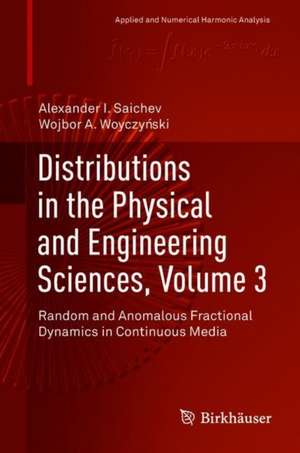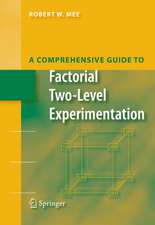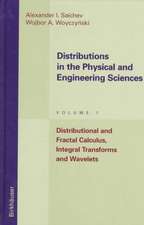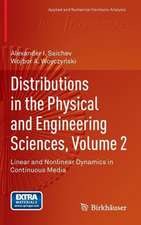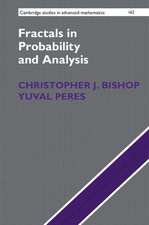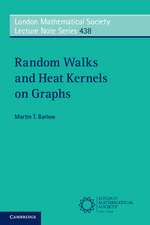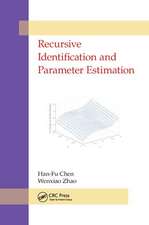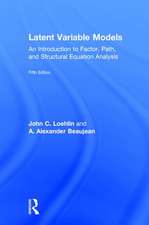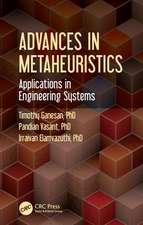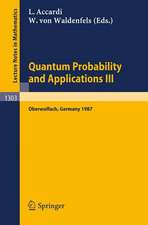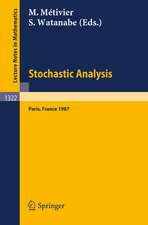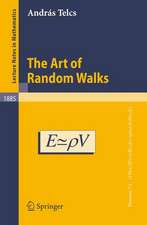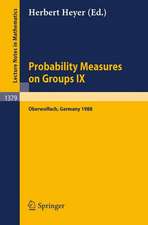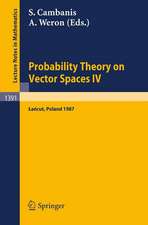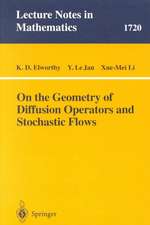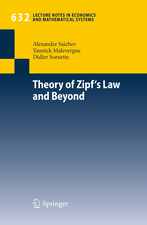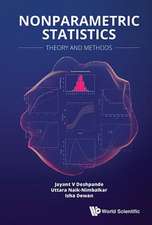Distributions in the Physical and Engineering Sciences, Volume 3: Random and Anomalous Fractional Dynamics in Continuous Media: Applied and Numerical Harmonic Analysis
Autor Alexander I. Saichev, Wojbor A. woyczyńskien Limba Engleză Hardback – 13 aug 2018
Chapters cover topics such as probability distributions; generalized stochastic processes, Brownian motion, and the white noise; stochastic differential equations and generalized random fields; Burgers turbulence and passive tracer transport in Burgers flows; and linear, nonlinear, and multiscale anomalous fractional dynamics in continuous media. The needs of the applied-sciences audience are addressed by a careful and rich selection of examples arising in real-life industrial and scientific labs and a thorough discussion of their physical significance. Numerous illustrations generate a better understanding of the core concepts discussed in the text, and a large number of exercises at the end of each chapter expand on these concepts.
| Toate formatele și edițiile | Preț | Express |
|---|---|---|
| Paperback (1) | 395.47 lei 6-8 săpt. | |
| Springer International Publishing – feb 2019 | 395.47 lei 6-8 săpt. | |
| Hardback (1) | 417.74 lei 38-44 zile | |
| Springer International Publishing – 13 aug 2018 | 417.74 lei 38-44 zile |
Din seria Applied and Numerical Harmonic Analysis
-
 Preț: 399.29 lei
Preț: 399.29 lei - 20%
 Preț: 673.02 lei
Preț: 673.02 lei - 17%
 Preț: 431.76 lei
Preț: 431.76 lei - 19%
 Preț: 443.08 lei
Preț: 443.08 lei -
 Preț: 412.57 lei
Preț: 412.57 lei - 15%
 Preț: 550.04 lei
Preț: 550.04 lei - 15%
 Preț: 653.98 lei
Preț: 653.98 lei - 18%
 Preț: 1014.28 lei
Preț: 1014.28 lei - 15%
 Preț: 647.92 lei
Preț: 647.92 lei -
 Preț: 413.37 lei
Preț: 413.37 lei - 15%
 Preț: 648.74 lei
Preț: 648.74 lei - 15%
 Preț: 654.77 lei
Preț: 654.77 lei - 15%
 Preț: 636.80 lei
Preț: 636.80 lei - 15%
 Preț: 532.89 lei
Preț: 532.89 lei - 15%
 Preț: 646.62 lei
Preț: 646.62 lei - 15%
 Preț: 653.98 lei
Preț: 653.98 lei -
 Preț: 397.38 lei
Preț: 397.38 lei - 15%
 Preț: 656.43 lei
Preț: 656.43 lei - 15%
 Preț: 661.97 lei
Preț: 661.97 lei - 18%
 Preț: 957.13 lei
Preț: 957.13 lei - 24%
 Preț: 829.74 lei
Preț: 829.74 lei -
 Preț: 398.35 lei
Preț: 398.35 lei - 20%
 Preț: 569.86 lei
Preț: 569.86 lei -
 Preț: 392.21 lei
Preț: 392.21 lei - 18%
 Preț: 1121.76 lei
Preț: 1121.76 lei - 18%
 Preț: 1001.32 lei
Preț: 1001.32 lei -
 Preț: 387.75 lei
Preț: 387.75 lei - 15%
 Preț: 653.98 lei
Preț: 653.98 lei - 20%
 Preț: 567.32 lei
Preț: 567.32 lei - 20%
 Preț: 573.77 lei
Preț: 573.77 lei -
 Preț: 406.80 lei
Preț: 406.80 lei -
 Preț: 387.38 lei
Preț: 387.38 lei - 5%
 Preț: 1168.71 lei
Preț: 1168.71 lei -
 Preț: 400.85 lei
Preț: 400.85 lei -
 Preț: 398.15 lei
Preț: 398.15 lei - 15%
 Preț: 644.49 lei
Preț: 644.49 lei - 19%
 Preț: 575.84 lei
Preț: 575.84 lei - 15%
 Preț: 703.71 lei
Preț: 703.71 lei - 20%
 Preț: 334.71 lei
Preț: 334.71 lei - 15%
 Preț: 525.54 lei
Preț: 525.54 lei -
 Preț: 405.06 lei
Preț: 405.06 lei - 15%
 Preț: 536.96 lei
Preț: 536.96 lei
Preț: 417.74 lei
Preț vechi: 515.73 lei
-19% Nou
Puncte Express: 627
Preț estimativ în valută:
79.93€ • 83.46$ • 66.01£
79.93€ • 83.46$ • 66.01£
Carte tipărită la comandă
Livrare economică 11-17 aprilie
Preluare comenzi: 021 569.72.76
Specificații
ISBN-13: 9783319925844
ISBN-10: 3319925849
Pagini: 398
Ilustrații: XX, 403 p. 61 illus., 6 illus. in color.
Dimensiuni: 155 x 235 mm
Greutate: 0.75 kg
Ediția:1st ed. 2018
Editura: Springer International Publishing
Colecția Birkhäuser
Seria Applied and Numerical Harmonic Analysis
Locul publicării:Cham, Switzerland
ISBN-10: 3319925849
Pagini: 398
Ilustrații: XX, 403 p. 61 illus., 6 illus. in color.
Dimensiuni: 155 x 235 mm
Greutate: 0.75 kg
Ediția:1st ed. 2018
Editura: Springer International Publishing
Colecția Birkhäuser
Seria Applied and Numerical Harmonic Analysis
Locul publicării:Cham, Switzerland
Cuprins
Introduction to Volume 3.- Notation.- Basic Distributional Tools for Probability Theory.- Random Distributions: Generalized Stochastic Processes.- Dynamical and Statistical Characteristics of Random Fields and Waves.- Forced Burgers Turbulence and Passive Tracer Transport in Burgers Flows.- Probability Distributions of Passive Tracers in Randomly Moving Media.- Levy Processes and Their Generalized Derivatives.- Linear Anomalous Fractional Dynamics in Continuous Media.- Nonlinear and Multiscale Anomalous Fractional Dynamics in Continuous Media.- Appendix A: Basic Facts About Distributions.- Bibliography.- Index.
Notă biografică
Alexander I. Saichev was Professor of Mathematics at the Radio Physics Faculty of the Nizhny Novgorod University and a Professor in the Department of Management, Technology, and Economics at the Swiss Federal Institute of Technology.
Wojbor A. Woyczynski is Professor of Mathematics and Director of the Center for Stochastic and Chaotic Processes in Science and Technology at Case Western University.
Textul de pe ultima copertă
Continuing the authors’ multivolume project, this text considers the theory of distributions from an applied perspective, demonstrating how effective a combination of analytic and probabilistic methods can be for solving problems in the physical and engineering sciences. Volume 1 covered foundational topics such as distributional and fractional calculus, the integral transform, and wavelets, and Volume 2 explored linear and nonlinear dynamics in continuous media. With this volume, the scope is extended to the use of distributional tools in the theory of generalized stochastic processes and fields, and in anomalous fractional random dynamics.
Chapters cover topics such as probability distributions; generalized stochastic processes, Brownian motion, and the white noise; stochastic differential equations and generalized random fields; Burgers turbulence and passive tracer transport in Burgers flows; and linear, nonlinear, and multiscale anomalous fractional dynamics in continuous media. The needs of the applied-sciences audience are addressed by a careful and rich selection of examples arising in real-life industrial and scientific labs and a thorough discussion of their physical significance. Numerous illustrations generate a better understanding of the core concepts discussed in the text, and a large number of exercises at the end of each chapter expand on these concepts.
Distributions in the Physical and Engineering Sciences is intended to fill a gap in the typical undergraduate engineering/physical sciences curricula, and as such it will be a valuable resource for researchers and graduate students working in these areas. The only prerequisites are a three-four semester calculus sequence (including ordinary differential equations, Fourier series, complex variables, and linear algebra), and some probability theory, but basic definitions and facts are covered as needed. An appendix also provides background material concerning the Dirac-delta and other distributions.
Caracteristici
Illustrates how the theory of distributions can be applied to solve problems in the physical and engineering sciences Includes a robust selection of example problems that can arise in real-life industrial and scientific labs Will be a valuable resource for researchers and graduate students who would like more exposure to probabilistic methods
